The Top Shelf: Case Files 036-040: "No Rez for the Wizard"
By Mento 1 Comments
Welcome to The Top Shelf, a weekly feature wherein I sort through my extensive PS2 collection for the diamonds in the rough. My goal here is to narrow down a library of 185 games to a svelte 44: the number of spaces on my bookshelf set aside for my PS2 collection. That means a whole lot of vetting and a whole lot of science that needs to be done, five games at a time. Be sure to check out the Case File Repository for more details and a full list of games/links!
Case File 036: Visceral Games's 007: Agent Under Fire
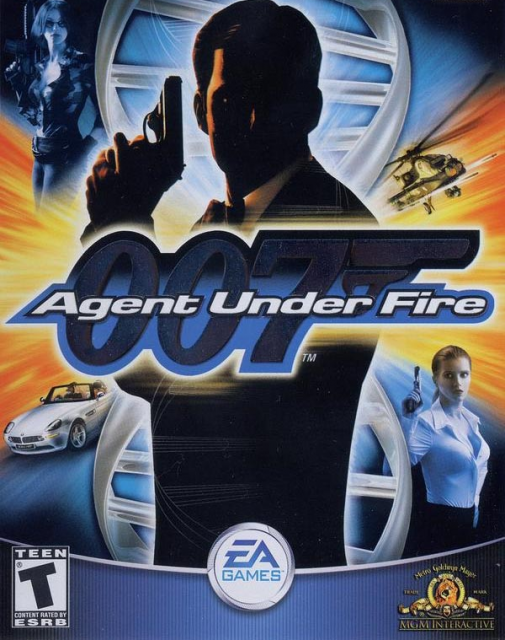
- Original Release (US): 13/11/2001
- Not PS2 Exclusive (GameCube and Xbox ports)
In a nostalgic way, I sort of miss the Bond games that followed the N64's revelatory GoldenEye 007. A few more movie adaptations were attempted by new license holders EA, all of which were the sort of standard lackluster licensed games that anyone could've reasonably expected GoldenEye itself to be, and at some point EA ran out of new Brosnan-era movies to monetize and decided to start creating their own. The games that emerged from this period - Agent Under Fire, Nightfire and Everything or Nothing - got closest to the appeal of the original GoldenEye with a combination of FPS and vehicle missions that incorporated GoldenEye's mission objectives, ensuring the player was doing actual spy shit along with gunning down endless waves of accented grunts. Agent Under Fire was the prototypical game of this new "we have the license and don't wanna wait for new movies dagnabbit" approach - its sequels were better, at least in my view - and helped to ensure that EA's tenure with the license at least ended on a half-decent note (if one were to excuse the unfortunate Rogue Agent). Then Activision took over for the Daniel Craig movie adaptations and... well, there's probably a reason we don't see as many Bond games around any more, though I hear Blood Stone was fairly decent. Anyway, the point I narrowly missed before is that all these Bond non-movie games bleed together in my mind, so I'll have to give this one another run through to refresh my memory. I'm looking forward to hopping back into that very time-and-place sub-genre for a hot minute. (Post-script: There won't be any other Bond games on this feature. Nightfire was a rental, and I have the GameCube version of Everything or Nothing. That's too bad, because I would've liked a chance to compare the three.) (Post-post-script: I did briefly consider a GameCube version of this feature as a sequel but it just so happens I own 44 GameCube games exactly, so that that wouldn't be quite as contentious...) Considered.
Case File 037: Racjin/Atlus's Wizardry: Tale of the Forsaken Land
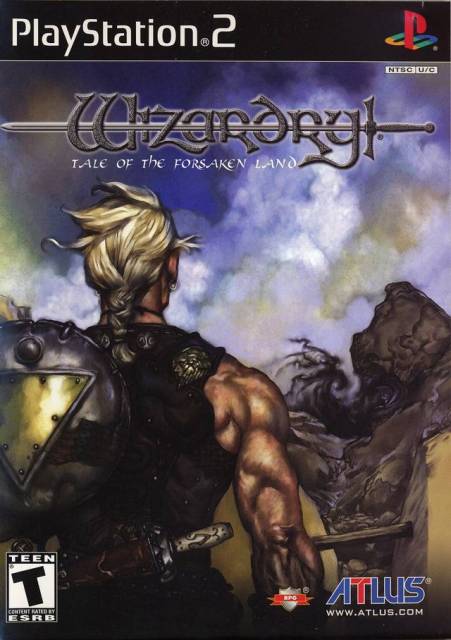
- Original Release (JP): 15/11/2001
- PS2 Exclusive!
I have a lot of affection for this Japan-developed "Wizardry Alternative", which in retrospect was an unusual means of being introduced to the venerable Wizardry series from which it spiritually hails. Wizardry is, of course, a decades-old CRPG franchise from American developers Sir-Tech that was already on its eighth and final entry by the time this game came out - Wizardry 8 was actually released on PC the previous day in the United States, November 14th 2001, in what I imagine was just an eerie coincidence. Wizardry: TotFL more than superficially resembles Sir-Tech's series insomuch as it features the same format - first-person tile-based dungeon crawler with turn-based combat - a close approximation of its upgradeable class system, "hardcore" aspects like how easy it is to get your party nuked by traps or powerful encounters, and a surface hub town you have to walk all the way back to (with the help of occasional teleporter shortcuts) in order to recuperate, buy new equipment, resurrect dead party members and save the game. It takes after its source material most in how the game is no pushover: the combat gets pretty sophisticated once it starts introducing party-wide tactical "plays", which uses the turns of multiple party members to pull off some tricky maneuvers, and while it's easy enough to get clobbered by monsters or swinging axe traps or pits each dungeon level will also eventually generate an insurmountable grim reaper enemy to keep the party on their toes if they've been dawdling too much (Persona 3, you might recall, would have a similar system). The game can be pretty rough in spots both graphically and mechanically speaking, but it has a lot of moxie and grit for a PS2 JRPG full of anime portraits and a few neat twists in its otherwise paper-thin story. I won't give it a free pass to the shelf, but I will afford it the same privilege I gave Final Fantasy X - high priority among those in contention for the remaining spots. Considered.
Case File 038: Harmonix's Frequency
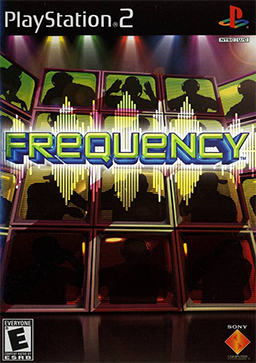
- Original Release (US): 19/11/2001
- PS2 Exclusive!
And so we introduce Harmonix. Harmonix has a long history with this site: Alex Navarro briefly worked for them, and former employees Eric Pope and John Drake still make semi-regular appearances in site content. Long before they became the maestros of plastic guitars and karaoke, however, Harmonix started with a duo of tube-racing/rhythm games for the PlayStation 2, of which Frequency was the first. Frequency sourced most of its music, as it would for many of its other games, from a combination of big-name external artists and Harmonix's own in-house talent. The game itself vaguely resembles a tunnel shooter like Tempest; instead of taking out incoming enemies though, it has players following lines of notes on multiple planes, each of which reflects specific instruments that comprise the music track. It was the sort of game that didn't require a whole lot of musical knowhow to excel at, just a good sense of rhythm and fast reactions, and I might go so far to suggest that most of the later Harmonix games would follow that blueprint. This game creates something of a dilemma for the purposes of this feature: before now I would eliminate games based on the fact that their sequels were superior in almost every way, and that's more or less true for Frequency and its sequel Amplitude. However, I don't actually own a copy of Amplitude. The only reason I have Frequency was because it was included in a bundle with a large number of other games. I suppose I never really got on the Harmonix train at any point - I've managed to elude the Guitar Hero games to this day - and for as cool as Frequency is, it doesn't really ignite any passion in me like other games in my PS2 collection do. Eliminated.
Case File 039: United Game Artists's Rez
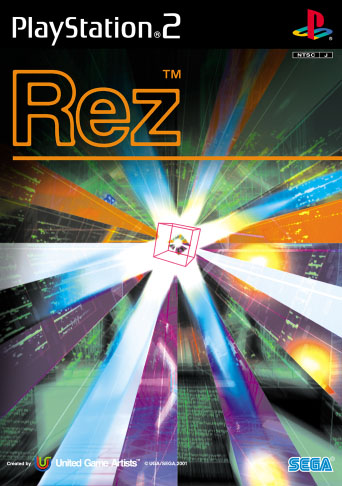
- Original Release (JP): 22/11/2001
- Not PS2 Exclusive (also released on Dreamcast, at least in Europe and Japan, and saw a recent revival)
Speaking of synth-based action-rhythm games, Rez perhaps needs no introduction at this point: an on-rails shooter game of the Panzer Dragoon mold that has players entering cyberspace to melodically eliminate viruses. They do this for the sake of Eden: a futuristic AI modelled on Lumi, a purehearted girl who was the first to be born in space in the game's fiction and who is also the star of that one Genki Rockets song that features in Lumines II and on the television in Travis Touchdown's apartment in No More Heroes in a weird criss-crossing of Japanese video games and music that I'm at a loss to properly explicate. Rez deals in its own take on "synaesthesia", a rare mental condition where music and sound become conflated with colors and images in the mind, and each of its short shoot 'em up levels is built in such a way that the player ends up creating their own music with the rhythmic elimination of enemy waves. It's all very striking in person, and part of the reason why its legacy as persisted for as long as it has. We have here another case like Final Fantasy X, however, where there's actually very little reason to go back to the PS2 original these days. The recently released Rez Infinite, which not only graphically remasters the game but adds VR support and more content besides, is the definitive modern Rez experience. If that wasn't sufficient reason to discard Rez from this list, there's also the fact that it saw a Dreamcast version that many would consider superior, though perhaps only because of its exclusivity: that version was never released in the States, and you know how it is with us Euros and our rare chances to lord it up when we receive a localization that the Yanks didn't. All the same, Rez is the sort of game you can boot up and play whenever you're in a contemplative mood (you can choose to attach whatever drug-related connotations to that phrase you desire), and I'm thus loath to eliminate it. Let's stick it on the shortlist instead. Considered.
Case File 040: Prokion's Legaia 2: Duel Saga
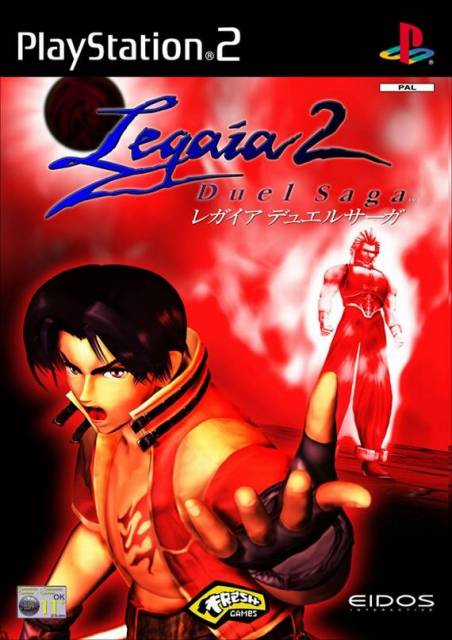
- Original Release (JP): 29/11/2001
- PS2 Exclusive!
Legaia 2's another one of my beloved curiosities for the PlayStation 2; a game that is far from perfect but packed with so many ideas and idiosyncrasies that it nevertheless holds a firm place in my heart. The sequel to Legend of Legaia, a PS1 RPG that is minimally more famous, Legaia 2 adopts its older sibling's bizarre penchant for a fighter input-based RPG combat engine. Similar to rolling out combos during Sabin/Tifa/Zell's limit breaks, you have a certain amount of space to input directional and button commands, specific combos of which unlock powerful attacks. You can decide to either stick to short and moderately strong "normals" or more elaborate and powerful "supers" depending on the situation. In addition, the game has an in-depth post-battle cooking system that many Tales games also feature, and a vaguely Avatar: The Last Airbender plot about martial artists and magical racism involving "Mystics" and their powers over elemental forces which are feared by the common folk. Naturally, despite being a race on the brink of extinction, the entire game is filled with Mystics including all the protagonists and antagonists. Legaia 2 is a hard game to adjust to, especially these days where much of its graphics and cutscene/dialogue quality so perfectly capture "early PS2 era", but it's not without its occasional charms: take this one track that plays during one of those irksome "maze forest" dungeons. Yet, and we seem to hit at least one of these cases in every episode of this feature so far, it's not a game that has any chance in the later elimination rounds. If I let it, the second round will no doubt become a procession of battles between high quality games I love and middling quality games I love, and I might as well avoid the heartbreak here and now. Eliminated.
Results
A rare majority of the featured games survived to the next round this time around, suggesting we're getting closer to the parade of hits that emerged as the PS2 hit its stride. I do intend to revisit Agent Under Fire for the second round considerations, though my plans for much more familiar Rez and Wizardry are to let them sit and stew as potential space-fillers if nothing else worthy steps up to the plate. That'll be the case for a great number of "Considered"s so far: if there's still space for them, they're in, but I need to ensure there's no competition for those places beforehand.
We're now 13 for 40 for those entering the second round, with over a quarter of the shelf spaces in contention. We also, still, have no confirmed spaces as of yet.
But wait, what's that coming up in next week's quintet? Could it be the first game to be instantly approved for the shelf, no questions asked? Just maybe!
< Back to the Case File Repository
(Hey guys, thanks for the feedback on this "five games or ten games per blog" quandary. I've decided to knock it up to ten games per blog after next week's entry. From there, we should see fourteen remaining blog entries for the first round of The Top Shelf, taking us deep into the slow Summer months just in time for a lot of PS2 game retrospectives as the second round narrows its focus down to scrutinizing individual titles. Should be fun. I think?)
